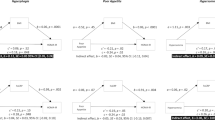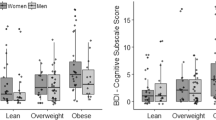Abstract
Background
This study aimed to determine the association between circulating leptin levels and total depressive symptoms as well as depressive symptom dimensions (cognitive and somatic) after controlling for important confounding factors.
Methods
The study sample was comprised of 135 participants with the metabolic syndrome. Depressive symptoms were measured using the Beck Depression Inventory—II. Leptin was measured using a leptin-specific enzyme immunoassay. Inflammation was assessed using C-reactive protein and interleukin-6 levels.
Results
Leptin was significantly associated with somatic depressive symptoms (β = 0.33, P = 0.018), but not total depressive symptoms (β = 0.27, P = 0.067) or cognitive depressive symptoms (β = 0.21, P = 0.182), after controlling for age, gender, body mass index, and insulin resistance. Further adjustment for C-reactive protein and interleukin-6 levels did not alter the relationship (β = 0.32, P = 0.023) between circulating leptin levels and somatic depressive symptoms.
Conclusions
Leptin is independently associated with somatic depressive symptoms in patients with the metabolic syndrome.
Similar content being viewed by others
References
Alberti KG, Zimmet P, Shaw J. Metabolic syndrome—A new world-wide definition. A consensus statement from the International Diabetes Federation. Diabet Med. 2006;23:469-480.
Isomaa B, Almgren P, Tuomi T, et al. Cardiovascular morbidity and mortality associated with the metabolic syndrome. Diabetes Care. 2001;24:683-689.
Lorenzo C, Okoloise M, Williams K, Stern MP, Haffner SM. The metabolic syndrome as predictor of type 2 diabetes: The San Antonio heart study. Diabetes Care. 2003;26:3153-3159.
Skilton MR, Moulin P, Terra JL, Bonnet F. Associations between anxiety, depression, and the metabolic syndrome. Biol Psychiatry. 2007;62:1251-1257.
Raikkonen K, Matthews KA, Kuller LH. Depressive symptoms and stressful life events predict metabolic syndrome among middle-aged women: A comparison of World Health Organization, Adult Treatment Panel III, and International Diabetes Foundation definitions. Diabetes Care. 2007;30:872-877.
Jonas BS, Franks P, Ingram DD. Are symptoms of anxiety and depression risk factors for hypertension? Longitudinal evidence from the National Health and Nutrition Examination Survey I Epidemiologic Follow-up Study. Arch Fam Med. 1997;6:43-49.
Nouwen A, Nefs G, Caramlau I, et al. Prevalence of depression in individuals with impaired glucose metabolism or undiagnosed diabetes: A systematic review and meta-analysis of the European Depression in Diabetes (EDID) Research Consortium. Diabetes Care. 2011;34:752-762.
Faith MS, Butryn M, Wadden TA, et al. Evidence for prospective associations among depression and obesity in population-based studies. Obes Rev. 2011;12:e438-e453.
Wellen KE, Hotamisligil GS. Inflammation, stress, and diabetes. J Clin Invest. 2005;115:1111-1119.
Suarez EC. C-reactive protein is associated with psychological risk factors of cardiovascular disease in apparently healthy adults. Psychosom Med. 2004;66:684-691.
Shelton RC, Miller AH. Eating ourselves to death (and despair): The contribution of adiposity and inflammation to depression. Prog Neurobiol. 2010;91:275-299.
Capuron L, Su S, Miller AH, et al. Depressive symptoms and metabolic syndrome: Is inflammation the underlying link? Biol Psychiatry. 2008;64:896-900.
Miller GE, Freedland KE, Carney RM, Stetler CA, Banks WA. Pathways linking depression, adiposity, and inflammatory markers in healthy young adults. Brain Behav Immun. 2003;17:276-285.
Wozniak SE, Gee LL, Wachtel MS, Frezza EE. Adipose tissue: The new endocrine organ? A review article. Dig Dis Sci. 2009;54:1847-1856.
Lu XY. The leptin hypothesis of depression: A potential link between mood disorders and obesity? Curr Opin Pharmacol. 2007;7:648-652.
Duman RS, Monteggia LM. A neurotrophic model for stress-related mood disorders. Biol Psychiatry. 2006;59:1116-1127.
Gutt M, Davis CL, Spitzer SB, et al. Validation of the insulin sensitivity index (ISI(0,120)): Comparison with other measures. Diabetes Res Clin Pract. 2000;47:177-184.
Matthews DR, Hosker JP, Rudenski AS, et al. Homeostasis model assessment: Insulin resistance and beta-cell function from fasting plasma glucose and insulin concentrations in man. Diabetologia. 1985;28:412-419.
Collins LM, Schafer JL, Kam CM. A comparison of inclusive and restrictive strategies in modern missing data procedures. Psychol Methods. 2001;6:330-351.
Antonijevic IA, Murck H, Frieboes RM, et al. Elevated nocturnal profiles of serum leptin in patients with depression. J Psychiatr Res. 1998;32:403-410.
Pasco JA, Jacka FN, Williams LJ, et al. Leptin in depressed women: Cross-sectional and longitudinal data from an epidemiologic study. J Affect Disord. 2008;107:221-225.
Labad J, Price JF, Strachan MW, et al. Leptin levels and depressive symptoms in people with type 2 diabetes: The Edinburgh type 2 diabetes study. Psychosom Med. 2012;74:39-45.
Dozois DJ, Dobson KS, Ahnberg JL. A psychometric evaluation of the Beck Depression Inventory—II. Psychol Assess. 1998;10:83-89.
Lorton D, Lubahn CL, Estus C, et al. Bidirectional communication between the brain and the immune system: Implications for physiological sleep and disorders with disrupted sleep. Neuroimmunomodulation. 2006;13:357-374.
Kupper N, Widdershoven JW, Pedersen SS. Cognitive/affective and somatic/affective symptom dimensions of depression are associated with current and future inflammation in heart failure patients. J Affect Disord. 2012;136:567-576.
de Jonge P, Ormel J, van den Brink RH, et al. Symptom dimensions of depression following myocardial infarction and their relationship with somatic health status and cardiovascular prognosis. Am J Psychiatry. 2006;163:138-144.
Doyle F, Conroy R, McGee H, Delaney M. Depressive symptoms in persons with acute coronary syndrome: Specific symptom scales and prognosis. J Psychosom Res. 2010;68:121-130.
Hoen PW, Whooley MA, Martens EJ, et al. Differential associations between specific depressive symptoms and cardiovascular prognosis in patients with stable coronary heart disease. J Am Coll Cardiol. 2010;56:838-844.
Linke SE, Rutledge T, Johnson BD, et al. Depressive symptom dimensions and cardiovascular prognosis among women with suspected myocardial ischemia: A report from the National Heart, Lung, and Blood Institute-sponsored Women’s Ischemia Syndrome Evaluation. Arch Gen Psychiatry. 2009;66:499-507.
Martens EJ, Hoen PW, Mittelhaeuser M, de Jonge P, Denollet J. Symptom dimensions of post-myocardial infarction depression, disease severity and cardiac prognosis. Psychol Med. 2010;40:807-814.
Roest AM, Thombs BD, Grace SL, et al. Somatic/affective symptoms, but not cognitive/affective symptoms, of depression after acute coronary syndrome are associated with 12-month all-cause mortality. J Affect Disord. 2011;131:158-163.
Schiffer AA, Pelle AJ, Smith OR, et al. Somatic versus cognitive symptoms of depression as predictors of all-cause mortality and health status in chronic heart failure. J Clin Psychiatry. 2009;70:1667-1673.
Smolderen KG, Spertus JA, Reid KJ, et al. The association of cognitive and somatic depressive symptoms with depression recognition and outcomes after myocardial infarction. Circ Cardiovasc Qual Outcomes. 2009;2:328-337.
Stewart JC, Janicki DL, Muldoon MF, Sutton-Tyrrell K, Kamarck TW. Negative emotions and 3-year progression of subclinical atherosclerosis. Arch Gen Psychiatry. 2007;64:225-233.
Munzberg H, Bjornholm M, Bates SH, Myers MG Jr. Leptin receptor action and mechanisms of leptin resistance. Cell Mol Life Sci. 2005;62:642-652.
Hafner S, Baumert J, Emeny RT, et al. Sleep disturbances and depressed mood: A harmful combination associated with increased leptin levels in women with normal weight. Biol Psychol. 2012;89:163-169.
Vgontzas AN, Bixler EO, Chrousos GP. Sleep apnea is a manifestation of the metabolic syndrome. Sleep Med Rev. 2005;9:211-224.
Hayano J, Carney RM, Watanabe E, et al. Interactive associations of depression and sleep apnea with adverse clinical outcomes after acute myocardial infarction. Psychosom Med. 2012;74:832-839.
Morris AA, Ahmed Y, Stoyanova N, et al. The association between depression and leptin is mediated by adiposity. Psychosom Med. 2012;74:483-488.
Cizza G, Ronsaville DS, Kleitz H, et al. Clinical subtypes of depression are associated with specific metabolic parameters and circadian endocrine profiles in women: The power study. PLoS One. 2012;7:e28912.
Herva A, Laitinen J, Miettunen J, et al. Obesity and depression: Results from the longitudinal Northern Finland 1966 Birth Cohort Study. Int J Obes (Lond). 2006;30:520-527.
Herva A, Rasanen P, Miettunen J, et al. Co-occurrence of metabolic syndrome with depression and anxiety in young adults: The Northern Finland 1966 Birth Cohort Study. Psychosom Med. 2006;68:213-216.
Fulton S, Pissios P, Manchon RP, et al. Leptin regulation of the mesoaccumbens dopamine pathway. Neuron. 2006;51:811-822.
Ahima RS, Bjorbaek C, Osei S, Flier JS. Regulation of neuronal and glial proteins by leptin: Implications for brain development. Endocrinology. 1999;140:2755-2762.
Plotsky PM, Owens MJ, Nemeroff CB. Psychoneuroendocrinology of depression. Hypothalamic–pituitary–adrenal axis. Psychiatr Clin North Am. 1998;21:293-307.
Sandoval DA, Davis SN. Leptin: Metabolic control and regulation. J Diabetes Complications. 2003;17:108-113.
Guo M, Huang TY, Garza JC, Chua SC, Lu XY. Selective deletion of leptin receptors in adult hippocampus induces depression-related behaviours. Int J Neuropsychopharmacol. In press. doi:10.1017/S1461145712000703.
Guo M, Lu Y, Garza JC, et al. Forebrain glutamatergic neurons mediate leptin action on depression-like behaviors and synaptic depression. Transl Psychiatry. 2012;2:e83.
Ford ES, Giles WH, Dietz WH. Prevalence of the metabolic syndrome among US adults: Findings from the third National Health and Nutrition Examination Survey. JAMA. 2002;287:356-359.
Acknowledgments
This study was funded by National Institutes of Health grant P01 HL365888.
Conflict of Interest
The authors have no conflict of interest to disclose.
Author information
Authors and Affiliations
Corresponding author
Electronic Supplementary Material
Below is the link to the electronic supplementary material.
ESM 1
(DOC 47 kb)
About this article
Cite this article
Chirinos, D.A., Goldberg, R., Gellman, M. et al. Leptin and its Association with Somatic Depressive Symptoms in Patients with the Metabolic Syndrome. ann. behav. med. 46, 31–39 (2013). https://doi.org/10.1007/s12160-013-9479-5
Published:
Issue Date:
DOI: https://doi.org/10.1007/s12160-013-9479-5




